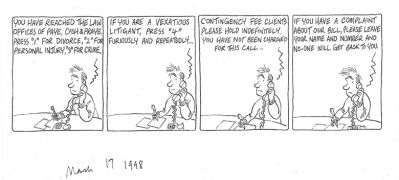I recently received an email from someone who is writing an article for their university newsletter and wanted my views on the potential impact of the Civil Litigation Costs Review on defendant panel solicitors. This is an interesting issue and one that, to be honest, I had not previously given much thought to. Much of the Jackson Review, at least so far as it covers the type of work undertaken by defendant panel solicitors, is focused on controlling the costs that claimant lawyers incur, rather than those of defendants. My previous posts on the subject have therefore focused on that aspect, rather than the impact on defendant firms.
Lord Justice Jackson’s Preliminary Report has, so far as is relevant, two main proposals. These are the ones most likely to find there way into the final report.
The first of these is extending fixed costs to all stages of the fast-track. Although the Preliminary Report, so far as I can see, does not spell this out, it seems clear that it is intended that fixed costs would apply to claimant solicitors but not defendant ones. If anyone is able to point me to something that suggests this view is mistaken, then please let me know. This proposal would not, in itself, have any direct impact on defendant solicitors. If my reading of the proposal is correct, and if only this change was made, it might lead to the strange outcome that defendant solicitors were able to recover more in costs than claimant solicitors. That would be a first.
The more interesting issue is whether the extension of fixed costs would have an impact on claims behaviour which would, in turn, impact on defendant firms. It is generally accepted that the introduction of the predictable costs regime encouraged some claimant firms to issue proceedings at the first opportunity to escape the fixed costs scheme (see page 126 of the Preliminary Report). On the one hand, an extension of fixed costs might encourage some claimant firms to settle cases as quickly as possible, doing as little work as possible in the process, to maximise their profit margins. This might reduce the number of issued cases and therefore have an adverse impact on the volume of cases being handled by defendant firms. Conversely, some claimant firms might be encouraged to push cases to the next stages of the claims process to secure the fixed fees applicable to those stages. This might, in turn, increase the volume of cases being dealt with by defendant firms. Time will tell.
If the claims process does become less adversarial, and claims settle more quickly and with less work, this may impact on what insurers are willing to pay defendant firms (much of the volume work currently being done under fixed fees agreements). This may be of particular relevance for firms that offer claims management services for pre-litigation work.
The second major suggestion in the
Preliminary Report is a move to one-way costs shifting. If Jackson LJ’s current thinking on this issue is correct (and this is a big “if”) this should be largely costs neutral from insurers’ perspective. However, it might have an unintended consequence for defendant firms. Traditionally, due to the downward pressure brought by insurers, defendant solicitors have charged ridiculously low hourly rates (I should know as this, in turn, impacts on what I can charge for defendant costs work). In the past, defendant solicitors have therefore been able to only recover low hourly rates from their opponent when they secure a costs order. However, in recent years there has been a growing trend for defendant firms to enter into discounted CCFAs. Where the claim is not successfully defended the insurer will pay the typical low hourly rates (as before). When a costs order is made in the defendant’s favour, the defendant firm can now (under the terms of the CCFA) recover costs from the opponent at the normal hourly rates appropriate for the case (usually
Guideline Hourly Rates). This has helped defendant firms in recent years to increase their profits.
However, if one-way costs shifting is introduced, defendant firms will be back to the position of only being able to recover the lower rates that insurers are prepared to pay (because there will be nobody else to pay). Admittedly, it is only in a minority of cases that positive costs orders are secured by defendants, but defendant firms are likely to notice the difference when it comes to their bottom line.
Click image to enlarge:

www.qccartoon.com


